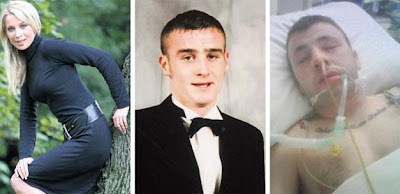couriers have died after packages have ruptured and poisoned their systems with massive doses of narcotics. 
Couriers who die transporting narcotics are "sliced like pieces of meat" by drug barons intent on getting their product to market, the head of the Revenue Commissioners' drug law enforcement arm has revealed.
Over €135m worth of illegal drugs have been seized by customs so far this year -- although most of this figure comes from the €110m haul of cocaine found off the coast of Cork last summer. Michael Colgan said yesterday that four "stuffers and swallowers" -- couriers who ingest drugs or carry them internally -- have been caught in Dublin Airport so far this year.
"Couriers have died," he said. "They've just been sliced open like pieces of meat. There's no regard for health and safety, they (drug barons) just want to deliver their consignment. The poor unfortunates are of no interest to them. "Our experience would be that most consignments are taken in by air. We have had very big consignments of herbal cannabis, mainly from South Africa and Thailand, which have come through Dublin Port but not all is destined for the Irish market." And smugglers use a range of ingenious methods to get drugs into the country. False bottoms and sides of suitcases are packed with drugs, while furniture is manufactured with false panels to evade customs officers and sniffer dogs.
"We generally know by the weight and you'll see shadows on the X-rays," said Mr Colgan. "People use body belts and strap the drugs to themselves, or carry them internally. "We've found drugs inside spray cans, which often work in that the product emits a foam or whatever it's supposed to, and we've had clothing impregnated with cocaine. "Most of the multi-ton consignments are cannabis. The product could be inside furniture, ovens and stoves or in tobacco products. People deliberately make products where drugs can be concealed. A lot are hermetically packed with attempts to minimise the odour and put off the sniffer dogs." Customs check out new technologies and methods to catch smugglers, and can call on the Naval Service and Air Corps to help track suspicious vessels. They are also involved in an international operation with several EU states and the US where agencies share intelligence. The UN estimates that up to 40pc of cocaine trafficked from South America is intercepted by law enforcement agencies. Spanish police have seized consignments of up to 40 tonnes. Drugs are generally incinerated amid massive security, and the proposed Poolbeg incinerator could be used by the Revenue Commissioners. Despite successes, Mr Colgan fears that the drug problem could escalate. "Cocaine seems to be growing year on year, and my main concern would be people moving to crack cocaine," he warned. "We have limited detections of crack here.''

Couriers who die transporting narcotics are "sliced like pieces of meat" by drug barons intent on getting their product to market, the head of the Revenue Commissioners' drug law enforcement arm has revealed.
Over €135m worth of illegal drugs have been seized by customs so far this year -- although most of this figure comes from the €110m haul of cocaine found off the coast of Cork last summer. Michael Colgan said yesterday that four "stuffers and swallowers" -- couriers who ingest drugs or carry them internally -- have been caught in Dublin Airport so far this year.
"Couriers have died," he said. "They've just been sliced open like pieces of meat. There's no regard for health and safety, they (drug barons) just want to deliver their consignment. The poor unfortunates are of no interest to them. "Our experience would be that most consignments are taken in by air. We have had very big consignments of herbal cannabis, mainly from South Africa and Thailand, which have come through Dublin Port but not all is destined for the Irish market." And smugglers use a range of ingenious methods to get drugs into the country. False bottoms and sides of suitcases are packed with drugs, while furniture is manufactured with false panels to evade customs officers and sniffer dogs.
"We generally know by the weight and you'll see shadows on the X-rays," said Mr Colgan. "People use body belts and strap the drugs to themselves, or carry them internally. "We've found drugs inside spray cans, which often work in that the product emits a foam or whatever it's supposed to, and we've had clothing impregnated with cocaine. "Most of the multi-ton consignments are cannabis. The product could be inside furniture, ovens and stoves or in tobacco products. People deliberately make products where drugs can be concealed. A lot are hermetically packed with attempts to minimise the odour and put off the sniffer dogs." Customs check out new technologies and methods to catch smugglers, and can call on the Naval Service and Air Corps to help track suspicious vessels. They are also involved in an international operation with several EU states and the US where agencies share intelligence. The UN estimates that up to 40pc of cocaine trafficked from South America is intercepted by law enforcement agencies. Spanish police have seized consignments of up to 40 tonnes. Drugs are generally incinerated amid massive security, and the proposed Poolbeg incinerator could be used by the Revenue Commissioners. Despite successes, Mr Colgan fears that the drug problem could escalate. "Cocaine seems to be growing year on year, and my main concern would be people moving to crack cocaine," he warned. "We have limited detections of crack here.''
Comments
Post a Comment